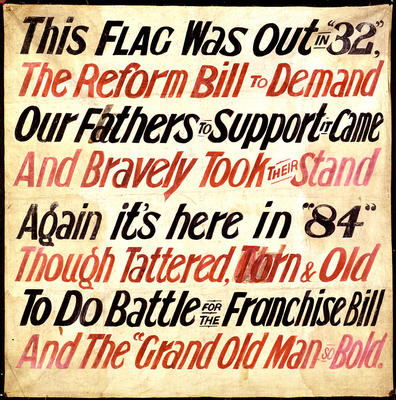
The Cutters' reform banner, which was carried in demonstrations in Glasgow supporting electoral reform in 1832 and 1884. Cutters are skilled metal workers.
The Parliamentary Reform Act (Scotland) of 1832 increased the number of male voters in Scotland from 4,600 to 64,500. The Reform Act (Scotland) of 1868 increased the number of voters again, to 230,000, and increased the number of Scottish Members of Parliament from fifty-three to sixty, including three from Glasgow. The secret ballot was introduced in 1872, and in 1884 William Gladstone's Liberal government introduced another franchise reform bill. The Parliamentary Reform Act of 1884 allowed rural inhabitants the same voting rights as city dwellers. The following year the Redistribution Act raised the number of Glasgow MPs to seven.
Reference: 42.87.352 / PP.1987.219.2
Reproduced with the permission of Glasgow City Council, Glasgow Museums
Keywords:
banners, electoral reform, Glasgow Franchise Demonstration, Members of Parliament, MPs, Parliamentary Reform Act (Scotland) 1832, Parliamentary Reform Act, 1884, Redistribution Act, 1885, Reform Act (Scotland), 1868, Secret Ballot Act, 1872, Third Reform Act (1884), trade unions, trades unions, voters
You have 0 images in your photo album.